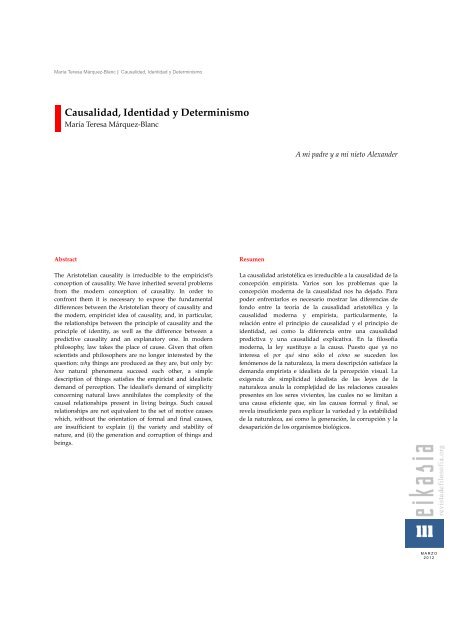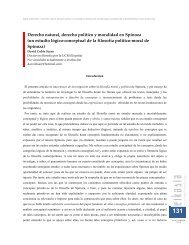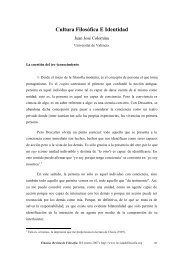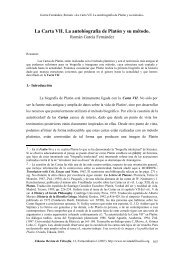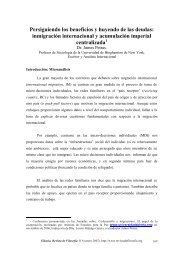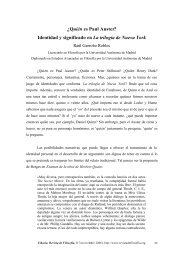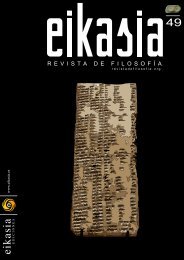Descargar número completo (4,15 MB) - Eikasia
Descargar número completo (4,15 MB) - Eikasia
Descargar número completo (4,15 MB) - Eikasia
You also want an ePaper? Increase the reach of your titles
YUMPU automatically turns print PDFs into web optimized ePapers that Google loves.
María Teresa Márquez-Blanc | Causalidad, Identidad y Determinismo<br />
Causalidad, Identidad y Determinismo<br />
María Teresa Márquez‐Blanc<br />
A mi padre y a mi nieto Alexander<br />
Abstract<br />
The Aristotelian causality is irreducible to the empiricist’s<br />
conception of causality. We have inherited several problems<br />
from the modern conception of causality. In order to<br />
confront them it is necessary to expose the fundamental<br />
differences between the Aristotelian theory of causality and<br />
the modern, empiricist idea of causality, and, in particular,<br />
the relationships between the principle of causality and the<br />
principle of identity, as well as the difference between a<br />
predictive causality and an explanatory one. In modern<br />
philosophy, law takes the place of cause. Given that often<br />
scientists and philosophers are no longer interested by the<br />
question: why things are produced as they are, but only by:<br />
how natural phenomena succeed each other, a simple<br />
description of things satisfies the empiricist and idealistic<br />
demand of perception. The idealist’s demand of simplicity<br />
concerning natural laws annihilates the complexity of the<br />
causal relationships present in living beings. Such causal<br />
relationships are not equivalent to the set of motive causes<br />
which, without the orientation of formal and final causes,<br />
are insufficient to explain (i) the variety and stability of<br />
nature, and (ii) the generation and corruption of things and<br />
beings.<br />
Resumen<br />
La causalidad aristotélica es irreducible a la causalidad de la<br />
concepción empirista. Varios son los problemas que la<br />
concepción moderna de la causalidad nos ha dejado. Para<br />
poder enfrentarlos es necesario mostrar las diferencias de<br />
fondo entre la teoría de la causalidad aristotélica y la<br />
causalidad moderna y empirista, particularmente, la<br />
relación entre el principio de causalidad y el principio de<br />
identidad, así como la diferencia entre una causalidad<br />
predictiva y una causalidad explicativa. En la filosofía<br />
moderna, la ley sustituye a la causa. Puesto que ya no<br />
interesa el por qué sino sólo el cómo se suceden los<br />
fenómenos de la naturaleza, la mera descripción satisface la<br />
demanda empirista e idealista de la percepción visual. La<br />
exigencia de simplicidad idealista de las leyes de la<br />
naturaleza anula la complejidad de las relaciones causales<br />
presentes en los seres vivientes, las cuales no se limitan a<br />
una causa eficiente que, sin las causas formal y final, se<br />
revela insuficiente para explicar la variedad y la estabilidad<br />
de la naturaleza, así como la generación, la corrupción y la<br />
desaparición de los organismos biológicos.<br />
111<br />
MARZO<br />
2012


